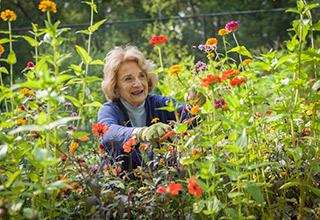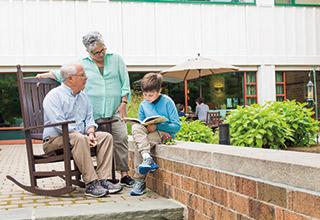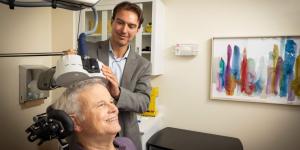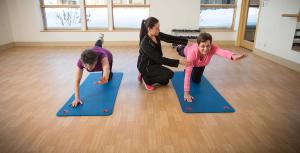6 Brain-Boosting Resolutions for the New Year
Habits anyone can adopt, made easier at Orchard Cove.

Given that brain health is crucial for older adults, it’s worth making it a priority for 2025. But what goals can you set to promote a healthy brain? If you’re not sure where to start, consider committing to one of the six pillars for maintaining good brain health from Dr. Alvaro Pascual-Leone, medical director of the Deanna and Sidney Wolk Center for Memory Health at Hebrew SeniorLife, senior scientist at the Hinda and Arthur Marcus Institute for Aging Research, and professor of neurology at Harvard Medical School.
1. Power up purpose and positivity
What gives your life meaning? Knowing the answer to that question may be more tied to your health than you realize — research has found that people with a greater sense of purpose in life have better cognitive function and a lower risk of developing dementia.
Committed to providing care that aligns with the Marcus Institute’s research, the staff at Hebrew SeniorLife’s continuing care retirement community Orchard Cove in Canton, MA, encourages residents to reflect on their unique sense of meaning. “If you have a sense of meaning and purpose in life, you are going to have higher health activation, which leads to better health outcomes,” says Member Services Manager Angela Labonté.
Another recent study found that having a positive outlook about aging increases the likelihood of recovery from mild cognitive impairment. Positivity truly can make a difference.
2. Prioritize sleep
Sleep is crucial to having a healthy brain. So much so, in fact, that Harvard Medical School researchers have found that not getting enough sleep in midlife can actually increase your risk of developing dementia later in life.
Orchard Cove Medical Director Dr. Jennifer Brinckerhoff, Occupational Therapist Jodi Bornstein, and Rabbi Joel Baron recently led a discussion on sleep and brain health attended by over 50 residents. During the discussion, they gave multiple suggestions to improve sleep quality, including:
- Going to bed and waking up at the same time every day
- Not drinking anything after dinner if you find yourself waking up in the middle of the night
- Wearing comfortable pajamas
- Considering your pillow type
- Adjusting your room temperature
Room temperature is important. Recent research from the Marcus Institute found that bedroom temperature has a big impact on sleep quality for older adults, and that the optimal sleep temperature for older adults is between 68 and 77 degrees Fahrenheit. Everyone has individual needs and preferences, so finding the temperature that works best for you is important.
3. Stay socially connected
Loneliness is an epidemic. The U.S. surgeon general has found that loneliness and social isolation can increase the risk of premature death by 26% and 29%, respectively. In other words, a lack of social connection increases the risk of premature death as much as smoking up to 15 cigarettes every day!
Marcus Institute research has identified resilience factors that mitigate the negative impact of loneliness: engaging in more activities, expanding your social network, and increasing the use of technology that allows for virtual social connection.
But making new friends, especially in older adulthood, isn’t always easy. The good news is senior living communities such as Hebrew SeniorLife's offer a range of social opportunities for every personality type, from the reserved introvert to the lively extrovert. Orchard Cove, for example, prioritizes a culture of connection through intentional practices including new resident orientation and social opportunities, a buddy system, meetings with the resident experience team, and affinity groups. “There are so many things that make Orchard Cove great, but the camaraderie amongst the people who live here is the most important thing,” says Phyllis, an Orchard Cove resident.
4. Continue to learn new things
Over the years, there’s been a lot of research pointing to the fact that adult education can promote brain health and even reduce the risk of cognitive impairment. For example, recent research has found that older adults who engage in cognitively stimulating activities like writing, playing cards, and doing crossword puzzles have a decreased risk of developing dementia.
Specifically for Seniors is a podcast hosted by Orchard Cove resident Larry Barsh. In an episode on challenging your brain, Hebrew SeniorLife’s Jodi Bornstein explained that older adults should choose activities that are “both fun and meaningful to you, because if it doesn’t mean anything to you and you have really no interest, just because you’re checking a box to say ‘this is good for my brain health,’ maybe you’ll do it for a week, but it’s not sustainable.” Larry added that his “personal favorite is learning something new that you have no idea how to do, like doing a podcast at age 87.”
Jodi also joined Speech Therapist Melissa Day to lead a “Brain Health Lab” program at Orchard Cove, giving residents the opportunity to experience curated computer programs designed to challenge their brains.
5. Keep active and exercise regularly
The benefits of regular exercise for weight management and cardiovascular health are well known. But did you know it’s good for your brain, too? According to the Alzheimer’s Association, regular exercise in midlife can reduce the risk of developing dementia by 30% — for Alzheimer’s disease, it’s 45%.
In another recent episode, Larry spoke with Orchard Cove fitness center staff about the importance of exercise for brain health. Tim Parke, a clinical specialist in geriatric physical therapy at Orchard Cove, explained that “the size of different parts of your brain increases with exercise. For instance, the hippocampus in general decreases in size as we get older by about 1.4% per year. But if you exercise, it can increase 2%. So you can sort of offset that [decrease] completely.” That’s particularly significant given that the hippocampus plays a major role in learning and memory.
When asked whether older adults with physical limitations should exercise, Orchard Cove’s senior fitness instructor Chris Young responded with an emphatic yes. “That builds more of a case to start an exercise program. The training goal for everybody is different and older adults, people with limitations — for them maybe the goal is just to more easily get out of a chair, maybe picking up a grocery bag,” he said.
He also added that it’s important to talk to your doctor before jumping into something new, listen to your body, and work with an exercise professional who’s well-educated and prioritizes your safety.
6. Eat a plant-forward diet
While no single diet can prevent cognitive decline, a growing body of research shows that what you eat can play a role in reducing your risk of dementia and keeping your brain healthy for longer.
“The science of food and nutrition is exploding, and we’re learning so much more, all of us, about the relationship between what we eat and how we feel, both physically and emotionally, how well our brains function, and how long we live,” says John Ralston, culinary director of Orchard Cove, in a discussion on the role nutrition plays in brain health. “If anybody can move their diet in that direction, vegetarian or plant-forward, they will experience better health outcomes.” Even being mostly compliant with a plant-based diet comes with health benefits.
Taking small steps, like planning for one vegetarian meal per week, adding vegetables to a sauce or smoothie, or building a meal around a salad are some easy ways to add plants to your diet. Orchard Cove residents who are interested in exploring a plant-forward diet have plenty of options too, including a daily vegetarian entree (also available as a side), a garden salad, a specialty daily salad, various vegetarian soups, and a four-bean mix with quinoa and baked tofu that’s always on the menu.
New year, new you: prioritizing brain health
Now that you know the six pillars of brain health, are you ready to make your resolution? Let Orchard Cove be your partner in achieving a healthier, sharper mind in 2025. Contact us online or call 781-859-3088 to take the first step toward your brain health journey.
Blog Topics
Learn More
Free Guide to Brain Health
Download our free guide, “Optimizing Your Brain Health,” for expert advice on boosting brain health at any age. Explore practical tips and resources from Hebrew SeniorLife’s Deanna and Sidney Wolk Center for Memory Health.

A Community for Residents, By Residents
Orchard Cove, in Canton, MA, offers living options that span the full continuum of care, including independent living. The community is bustling with activities, from life-long learning to entertainment.

Senior Living
Hebrew SeniorLife offers a variety of senior living options, including independent living, assisted living, and enhanced living. There are options for every lifestyle and budget.




